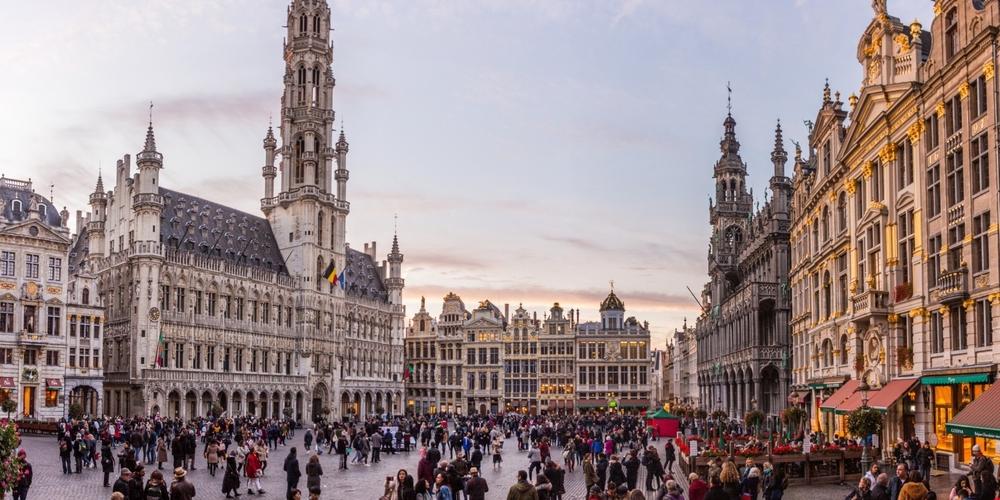
Last week, researchers presented the results of the fifth Brussels Taalbarometer (Language Barometer). The VUB has been researching the language use and knowledge of Brussels residents for 25 years. The latest results show that people are more cosmopolitan than ever before. “Language diversity in Brussels is increasing significantly,” says researcher Mathis Saeys. “At the same time, the number of Brussels residents who speak neither French, Dutch nor English is also rising.”
You were a researcher on the new language barometer. How was it developed?
Mathis Saeys: “It was created based on a representative sample from the National Register, with the aim of scientifically mapping language use in Brussels. The concept of the language barometer is thanks to the late sociolinguist Rudi Janssens. He wanted to gain a better understanding of the different languages spoken here.”
How diverse is language use in the capital in 2024?
“I would say increasingly diverse. While 72 languages were spoken in the capital in the first language barometer, there are now 104, and possibly even more. This is not really surprising, as Brussels is currently home to 180 nationalities. The top three have remained unchanged in recent years: French remains the most known language in Brussels, English has strengthened its position as the second most known language, and Dutch is in third place.”
The dominance of French was already being challenged in previous surveys. What are the latest findings?
“In absolute terms, French is still the most important home language, but its share continues to decline, from 51.8% in 2001 to 41.3% now.”

Mathias Saeys
“A quarter of Brussels residents have taken a language course, and a quarter of those took a Dutch course. Offering language courses is certainly an opportunity for the VUB”
What about knowledge of Dutch?
“Overall, we see that knowledge of Dutch in Brussels is declining, from 33% in 2000 to 22.3% now. But we do see a clear turnaround: this language barometer shows that knowledge of Dutch is improving again. In 2018, only 16% of people reported speaking Dutch, much less than now. That is quite remarkable. At the same time, we see that the number of families where Dutch is spoken and passed on to the next generation remains stable. More than that, those who speak Dutch today do so not only more often but also better, according to our research. There are several causes. On the one hand, there is an increasing group of Dutch-speakers from Flanders settling in the capital, and on the other hand, there is the success of Dutch-language education, which especially benefits young Brussels residents. The influence of education on language skills cannot be underestimated.”
Is this influence comparable in all schools?
“We didn’t investigate this in detail. What is striking, however, is that only 6.5% of Brussels residents who went to French-speaking schools in Brussels say they speak Dutch. In 2000, this was 20%. On the other hand, of the Brussels residents who attended Dutch-speaking schools, 83% say they speak French. That is quite a high figure and a big difference from the first group.”
How many Brussels residents are proficient in all three of French, English and Dutch?
“Currently, 12.6% of Brussels residents are proficient in all three contact languages, down from 16.4% in 2000. About half of the inhabitants use at least two of the contact languages. At the same time, the number of Brussels residents who speak neither French, Dutch nor English is rising. This applies to about one in 10 people, mainly non-EU nationals of middle age with low to medium education levels.”
How important is knowledge of these contact languages when living in Brussels?
“I would say it’s crucial. Knowledge of these languages not only opens doors socially and recreationally, but it also makes integration into the job market easier. For most jobs in Brussels, you need to speak at least two contact languages. The role of Dutch in this should not be underestimated. Brussels residents are aware of this, and so we notice an increasing demand for Dutch language courses. A quarter of Brussels residents have taken a language course, and a quarter of those took a Dutch course. Offering language courses is certainly an opportunity for the VUB. A current successful example is the Medical French course, which increases job opportunities in healthcare.”
Which other languages are in the top 10 most spoken in Brussels?
“Spanish, Arabic, Italian, German, Portuguese, Turkish and Romanian, the first time an Eastern European language has been in the top 10.”
Finally, what do you think the next language barometer, in five years, will look like?
“It will probably be even more complex, with even more multilingualism among Brussels residents. I also see the position of Dutch in the capital strengthening further. Brussels is more than ever a city of many languages, and this will only become clearer in the coming years.”
Bio Mathias Saeys
Mathis Saeys holds master’s degrees in political science and urban studies. As a young researcher, he participated in the research on the mapping and analysis of multilingual initiatives in the Brussels-Capital Region. He is responsible for the language barometer research in Brussels and the Flemish Periphery at the BRIO documentation centre.